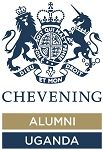Projects
The Chevening Alumni Association of Uganda, working with its partners implements several projects and initiatives aimed at making a positive impact in the community. These are inline with the alumni’s commitment to give back to the community.
Kampala Youths ABCs for Waste and Climate Action
The Chevening Alumni Association of Uganda (CAAU) is implementing the ‘Kampala Youths ABCs for Waste and Climate Action’ project which is aimed at engaging the young people to act on the climate crisis.
Focusing on waste management, the project is encouraging young people to follow the ABCs of climate action;
A – Adopt a positive attitude towards climate action
B – Be mindful of your behavioural choices and their impact
C – Connect with your community and promote sustainable practices

Skilling Programme for urban refugees
In 2022, the Chevening Alumni Association of Uganda (CAAU) embarked on a project to skill refugee communities in metropolitan Kampala with essential skills;
1 – Through a series of workshops, the association delivered training sessions on legal, human, and gender rights which are critical for the effective integration of refugees in the local communities in the city.
B – In partnership with Young African Refugees for Integral Development (YARID), impart refugees with digital skills, and furnish an ICT innovation hub at YARID equipped with 10 desktop computers and 12 months paid internet to support refugees through ICT, online learning and skills development.

Promoting inclusive education for Persons with Disabilities (PWDs)
In 2022, the Chevening Alumni Association of Uganda (CAAU) embarked on a project to promote inclusive education for persons with disabilities by constructing a modern Adaptive Technology resource center at the Kampala School of the Physically Handicapped. The resource center was equipped with computers to aid their education and access to all relevant information online, closing the gap of internet access for PWDs. This was intended to provide an inclusive education to enable learners with disabilities to access equitable education, allowing learners with disabilities to study and mingle with other students within a similar education system.

